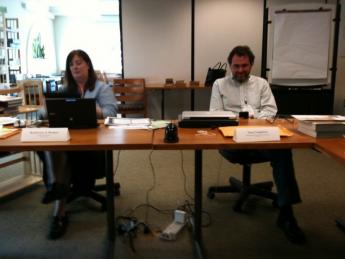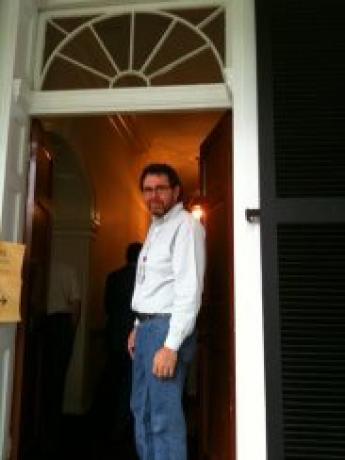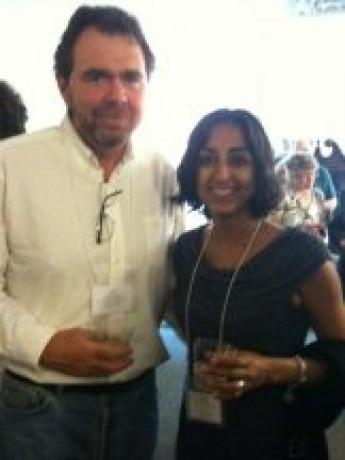Antiquarian Booksellers' Association of America Between the Covers Rare Books, Inc.
Unprepared, Unpatriotic, and Unrepentant - again

By Tom Congalton
I’ve recently returned from my fourth year of teaching at Rare Book School (RBS) located at the University of Virginia in Charlottesville. RBS is the oldest and most prestigious teaching program devoted to rare books in the world. Every year the School runs a full program of intensive weeklong classes on specific topics germane to the rare book world.
Curiously, among the faculty of some fifty-odd international authorities on rare books (and some of them are very odd indeed, myself not least among them), I am the only member who is also a rare bookseller. The vast majority of the faculty members are world-renowned scholars, rare book librarians, technical experts and so forth.
What, you might ask, is RBS doing letting a rare bookseller teach a course at an institution largely devoted to the scholarly study of antiquarian books?
And in my particular case, why would they allow in a dealer who is largely known in the trade for dealing in modern literary first editions? (Although if you are still laboring under the illusion that Between the Covers only deals in modern first editions, you might want to check out the nearly quarter of a million books that we offer online.)
Isn’t that rather like letting the fox into the henhouse? Here I am an admittedly shameless purveyor of rare books now let loose amongst unsuspecting librarians, scholars, and collectors. Clearly the answer is that someone wasn’t paying close enough attention when they invited me to teach!
Or, no, maybe they were.
For one thing I have an assigned co-teacher, Katherine Reagan, the Curator of Rare Books at Cornell University. Katherine is a decade or so younger than I, but she is clearly the boss, charged with keeping the course on track and on schedule.
I also rather suspect that she has been charged with keeping me in line when I try to turn every perfectly good teaching opportunity into a splendid new opportunity for Cornell to make some magnificent acquisition. She usually uses these as a perfectly good teaching opportunity to encourage me to become a generous donor to Cornell’s magnificent special collections.
I’m also suspicious that she may be charged with keeping me from drinking too much of the free wine at the numerous receptions that accompany the lectures that occur throughout the week.
At least she usually succeeds in the first two cases.
The course we teach is called “Printed Books since 1800: Element of Description and Analysis”, or at least it was called that on my nametag, which I thought made it sound suitably grand. This is a great name for a course, and after four years, I’m still trying to figure out what it means.
At an early meeting in 2007, Terry gave us the title for the course. It is a mark of his particular genius that when we asked him what he wanted us to include in the course, he just smiled at us. And incidentally, Terry is indeed sort of a certified genius (unlike me, who occasionally claims without any apparent justification to be one), as he was awarded a $500,000 MacArthur Genius Award a few years ago in recognition of his creation of the School (and most of which money, I suspect, he has siphoned back to the School).
In any event, after generous doses of anxiety, prescription medications, and alcoholic libations, and in the fullness of time, we created our course. Over the past few years it has been moderately successful even though we are just now figuring out ourselves what its focus really is.
By the way, a very interesting feature of RBS is that at the end of the course, each of the students is asked to fill out a very detailed evaluation form, and is encouraged to be honest about the instructors’ performance. As if that weren’t enough, RBS then posts ALL of the evaluations on their website.
So if you ever find yourself running out of disparaging remarks to make about me, do please take a break, and go to http://www.rarebookschool.org/courses/general/g30/ and find out the creative ways that others have approached the task of disparaging me. Enjoy.
On Sunday evenings at RBS there occurs registration for faculty and students and then an introduction of the “world class faculty” by the co-editor of “The Oxford History of the Book” and current RBS director Michael Suarez. I’ve noticed that he always introduces me first, not, I suspect, because of the primacy of my world class-ness, but more likely because he probably prefers to get that out of the way before anyone else notices. A reception follows where Katherine and my wife Heidi, who was also taking a class, get their first opportunities to stand between me and the wine selection.
It is difficult to mention RBS without mentioning the splendid staff, both fulltime and Summer volunteers, who run the program. To name only a couple of them, the Assistant Director, Barbara Heritage (how’s that for the name of a guardian of culture?) is a human dynamo who was unendingly helpful in helping us create our course. We even make her give a lecture during the week utilizing RBS’s great teaching collection of the many incarnations of “Jane Eyre”.
Our “follower”, Tess Goodman, while still an undergraduate, is charged with keeping us in line, supplying us with rare books from UVA’s special collections, and keeping us from using the first edition of “Leaves of Grass” as a drink’s coaster. I’m pretty sure that I’m going to look up one day and discover that Tess is running either a large university or a small country. I, for one, won’t be surprised.
The staff at RBS is so good that I’ve poached one member, Ken Giese, for my own staff, and have often given come-hither (and no doubt confusing and disturbing) looks to some of the others of the staff if I thought that they might be lured away.
Indeed a couple of years ago when Terry Belanger himself announced his retirement from the Directorship at RBS, we had the following brief conversation while he dispensed wine at the closing reception for the week’s classes:
Me (insinuatingly): Have you ever considered working in the rare book trade?
Terry (fixing me with a cold and forbidding stare): I CAN NOT BE BOUGHT!
Me: Can you be rented?
During class weeks Monday mornings start, bright and early, with breakfast served in the RBS pressroom (you know, the place where they keep the printing press) and with classes beginning and extending through Friday.
This year Monday fell on American Independence Day, the Fourth of July, and thus I was prevented from my usual July 4th routine of doing good deeds and performing patriotic acts and instead was forced to teach my class. While you all were barbequing, or having a lovely day at the beach I was busy dispensing knowledge in order to save world book culture. No really, it was nothing. Such is the lot of the longsuffering rare bookseller.
There were consolations though. After class there was a lecture at Jefferson Hall on the Declaration of Independence delivered by Selby Kiffer of Sotheby’s, whom has sold more copies of the first edition of the actual printed document than any one left alive.
Afterwards RBS hosted a reception at a pavilion on the famous Lawn designed by Thomas Jefferson, not coincidentally the founder of the University of Virginia. It seemed somehow appropriate to spend the Glorious 4th in buildings designed by the primary author of the Declaration of Independence. Indeed I declared myself independent and drank as much of the champagne as I could before Katherine or Heidi noticed.
I could tell you all about the contents of my class, but then you wouldn’t have to take it. And I have a feeling it’s the only way that I can preserve my place in academia!
>>> Rare Book School


